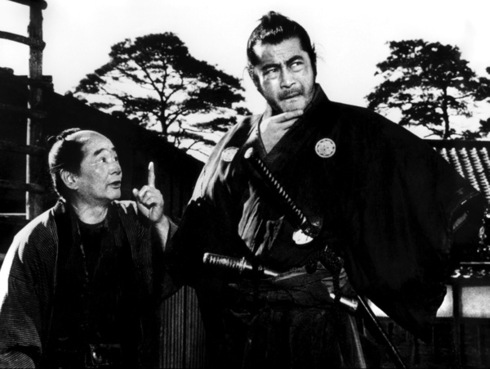Yojimbo
PostED ON 13.10.2015 AT 11:10AM
Kurosawa 1961- A vigilante is in town and his services are for sale. Yojimbo is a samurai, but mostly a mercenary. When he arrives in this city of 19th century Japan, he is mainly filmed from behind (at a wide angle) to prove that he fears no one with his upright sword. Cool, aggressive music accompanies his walk. Kurosawa thus introduces his hero in a boastful and entertaining way, with the confidence of a director possessing the savoir-faire of a good tempo. And immediately the Japanese filmmaker plays out his filmic skills composed of stunning images like a dog lugging around a hand in its mouth. The images are made to shock, and yet hardly make the hero blink, demonstrating the fact that he is indeed a man of experience.

This hero who nonchalantly eats, listens, scratches his nose, and doles out advice acts like an apparently fearless being, an example of sovereignty in the heart of a society of shopkeepers, peasants or innkeepers. Inevitably, everyone would like to have him on his side. He reassures because he ensures. A thinly-disguised version of a western? Not when you understand the genius of Kurosawa, setting up his well-oiled directing machine with a simple idea: the hero is certainly a tough guy, but could he also be a man who, without warning, sells to the highest bidder? And who knows if he will keep his promises? Is he not a real public danger, because, ultimately, is he as brave as he claims? Pushing this ambiguity to the limit, Kurosawa maintains a permanent tension, with ever renewed challenges, leading one to ask an excellent question: to which side can life tip a human being, depending on his weaknesses… but also his strengths? Enthralling.
Virginie Apiou

